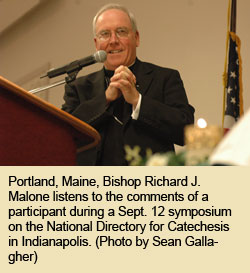At catechetical symposium, bishop shares importance of evangelization
By Sean Gallagher
 The National Directory for Catechesis (NDC), approved by the U.S. bishops in 2005, is intended to help American catechetical leaders be responsive to the prevailing culture and to understand all religious education ministries in light of the Church’s mission of evangelization.
The National Directory for Catechesis (NDC), approved by the U.S. bishops in 2005, is intended to help American catechetical leaders be responsive to the prevailing culture and to understand all religious education ministries in light of the Church’s mission of evangelization.
This was the message that Portland, Maine, Bishop Richard J. Malone shared with more than 150 leaders of archdiocesan parishes and schools at a Sept. 12 symposium on the NDC sponsored by the archdiocesan Office of Catholic Education at The Atrium conference center in Indianapolis.
From the start of his remarks, Bishop Malone emphasized the importance of evangelization in catechesis.
“If there’s one overriding principle in the new directory for catechesis, it’s that everything we do, not only in catechesis but across all the ministries represented here, everything has an evangelizing dimension to it,” said Bishop Malone, a member of the U.S. Bishops’ Catechesis Committee.
He went on to explain what evangelization, as it is lived out in practical terms, really means.
“Fundamentally, it is simply to live one’s Catholic life in such a way that it gives witness to others, not that we’re perfect, but that we’re different because we belong to Jesus,” Bishop Malone said. “There’s something different about a Catholic Christian.”
Bishop Malone also spoke about the strong emphasis that the NDC places on the cultural context in which evangelization happens in America.
“We really can’t figure out how to do what we have to do unless we keep our finger on the pulse of the cultures in which we’re doing our ministry,” he said.
Bishop Malone described the concept of a culture as “the mood, the atmosphere, the general assumptions and values that are floating around” and said that “it’s an atmosphere more than a system.”
He then described several dominant themes in American culture, including the valuing of freedom, even if its purpose is sometimes misunderstood, and moral relativism.
Participants in the symposium also shared their estimation of what is important in American culture. Among the traits mentioned were consumerism, a priority of the individual over the community and a lack of historical perspective.
“We do not evangelize, we do not catechize, we who are ordained do not preach the Gospel at Sunday Mass in a vacuum,” Bishop Malone said.
Archbishop Daniel M. Buechlein, who in his work on the Committee on Catechesis helped craft the NDC, also shared his thoughts about what should be the priorities in catechetical ministry today.
Foremost among them, the archbishop said, was prayer.
“Pope Benedict XVI, in his … encyclical, ‘God is Love,’ said that we tend to think that sometimes that prayer is not so important because there’s so much to do,” Archbishop Buechlein said. “But he makes a very impassioned plea that we see that prayer is the source of authentic and genuine mission and ministry in the Church.”
He also told the catechetical leaders at the symposium that while developing good teaching methodologies is important, “teaching from experience alone” is inadequate and that proper emphasis should be placed on passing on the content of the faith.
Encouraging all Catholics to grow in awareness of the importance of their vocation was also a message from the archbishop.
“That includes lay leadership. We need help so badly,” he said. “We also need priests, and we need consecrated women and men. Please don’t neglect helping our folks understand this as part of the needs of our local Church.”
During a break in the symposium, Mary Jo Thomas-Day, the director of religious education at St. Monica Parish in Indianapolis, spoke about how hearing again the basic principles and priorities in catechesis is still important to her.
“I think just like we promote our adults to be in faith formation throughout their lives, we as catechetical leaders have to be updated on what the Church is teaching in order to teach our parents and students,” she said. “It re-energizes me to go out and continue my mission because I see so many others doing the same thing.”
Thomas-Day, a 28-year veteran in catechetical ministry in the archdiocese, ministers alongside Kenna Brewer, a newcomer to religious education ministry who is a participant in the University of Notre Dame’s Echo Program, which seeks to recruit and form the next generation of catechetical leaders.
“I think that the benefit of participating in something like this with leaders of our Church who have a much broader understanding of what is going on … is that they’re able to more accurately contextualize [the NDC] for us,” said Brewer. †
